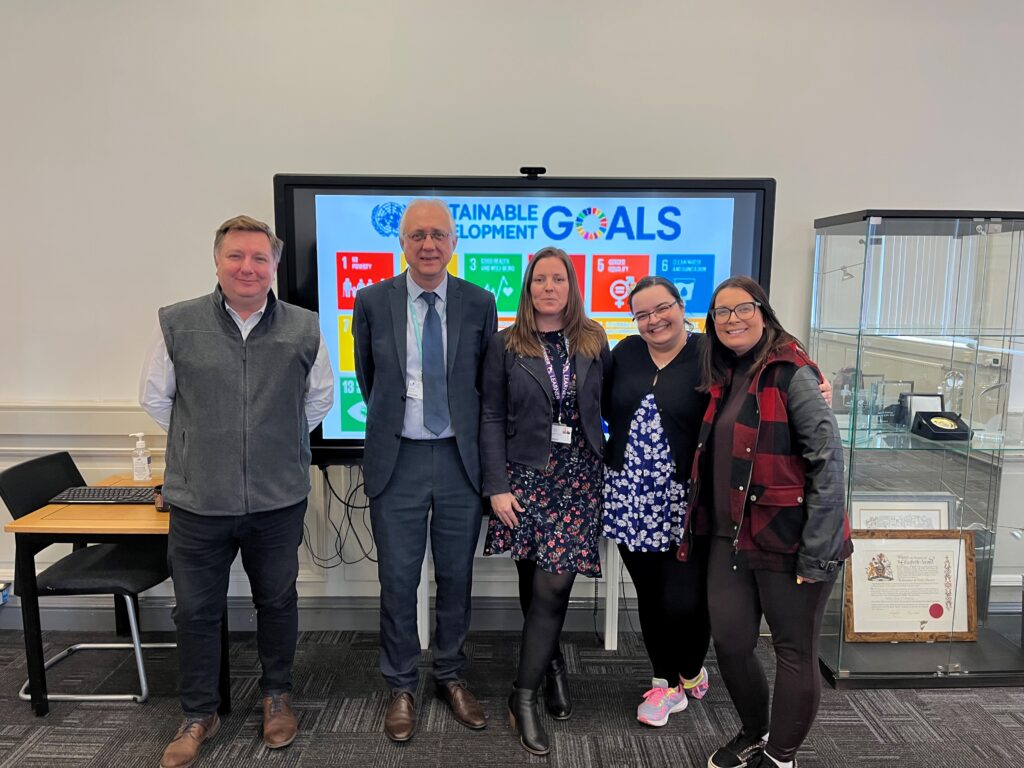Sustainability leadership skills for employers

Sustainability leadership skills for employers are the essential knowledge-based and practical skills necessary for leaders and managers, particularly in small and medium-sized enterprises (SMEs), to enhance the sustainability of their business operations.
These skills could encompass various areas, such as adopting energy-efficient technologies, implementing changes in working practices, enhancing automation, and initiating productivity improvements.
They might extend to understanding how to access funding to support sustainability enhancements, obtaining knowledge support, and achieving green accreditation to ensure compliance with procurement frameworks.
Colleges have significant links with employers across the region and have access to funding from sources such as the Local Skills Improvement Fund (LSIF) and InnovateUK.
As recognised by Rosie Peacock Lead Specialist for Innovation Skills, Innovate UK:
Far more than being education providers, FECs are becoming increasingly important in our innovation ecosystems. As place-based anchor institutions, they have an important role to play in supporting local growth, making them well-positioned to increase the capacity and capability of local businesses.
Opportunities for Adult Education in Neighbourhoods
Colleges can develop short programmes in sustainability for business leaders, aligning their Innovate UK activity with sustainability leadership programmes for employers.
The Midlands is also home to many well-established networks intended to support businesses on their transition to low carbon and to facilitate peer-to-peer learning. For example, the Innovative Low Carbon Working Group is a cross-sector network whose membership consists of practitioners from universities, local authorities, businesses and voluntary organisations, from across the West Midlands. The group meets quarterly and provides each member with an opportunity to propose and develop collaborative project ideas and to share good practice in relation to the low carbon and innovation agenda.
Colleges can help business, by signposting employers to these networks, to ensure that businesses can learn from others in the low carbon sector.
Colleges can also signpost employers to other sources of support. For example, The Pilot Business Energy Advice Service (BEAS) is offering 4,000 free energy assessments to small businesses across the West Midlands, including Birmingham, Coventry, Dudley, Sandwell, Solihull, Walsall, and Wolverhampton, as well as Worcestershire, and the Marches, Warwickshire and Stoke and Staffordshire.



Case Studies

Dudley College and The Dudley Group Hospitals NHS Foundation Trust work closely together on initiatives to foster and develop the talent of the Trust’s clinical and non-clinical staff. The Trust is also committed to reducing carbon emissions and becoming more sustainable, as set out in their ambitious Green Plan to 2025. Building on the partnership, the college developed a bespoke training programme for the Trust to help the Trust’s staff adopt sustainable practices across their hospitals and community centres. The programme, tailored to diverse roles within the Trust, covers the principles of sustainability, carbon reduction, waste management, and green procurement. Participants work in groups to develop projects addressing sustainability challenges in their specific areas of work, leading to practical solutions implemented across the Trust’s workplaces. The programme was such a success, the college has now rolled it out to its own staff!!
What the group appreciated most was being in a room to talk through ideas together.
Ninette Harris, NHS Sustainability Lead, Dudley Group NHS Foundation Trust

Coventry College, in collaboration with Birmingham Enterprise Company, developed a nationally acclaimed ‘sustainability management programme’ designed for managers aiming to transition towards sustainability roles or to advance their organisation’s response to the climate crisis. The eight-week course covers various sustainability aspects, offering online sessions complemented by mentoring. Supported by the West Midlands Combined Authority, the programme aligns with the region’s net zero emissions by 2041 goal. Over 50 participants have benefited to date, with many advancing in their careers. Feedback has led to the launch of a second course, ‘sustainable digital transformation’, focusing on data analysis.
The college is spearheading green skills development with support from industry leaders like BEC. This partnership is creating excellent career opportunities for West Midlands residents in a crucially needed skill area.
Andy Schneider - the college’s Director of Curriculum
Signposting for Colleges
Sustainability leadership skills for employers
Align sustainability support for SMEs with WMCA energy audits.
Colleges should ...
Working collaboratively with WMCA align support for SMEs with WMCA energy audits.
Align Innovate UK activity with sustainability leadership programmes.
Colleges should ...
Align the FE colleges’ Innovate UK funded activity with programmes sustainability and green leadership opportunities.
Develop short programmes in sustainability for business leaders.
Colleges should ...
Develop short, modular, and micro modular leadership programmes for SMEs to support their journey towards sustainability.

